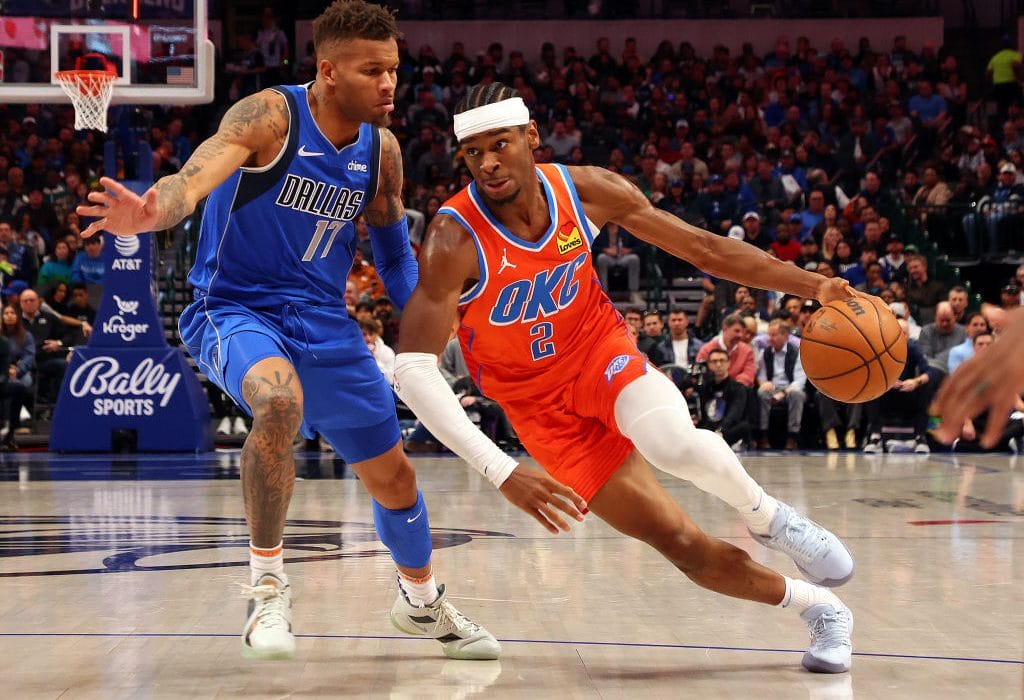In our world’s most eminent professional basketball league, the NBA, no young star is currently shining any brighter than the 25-year-old Shai Gilgeous-Alexander.
This Oklahoma City Thunder standout won first team all-NBA honors last season, and one top basketball analyst is calling him “one of the craftiest scorers in the league.” Gilgeous-Alexander is “leaving opponents guessing,” this analyst gushes, “which way he’s going to move next.”
But no one ever has to guess where the owner of the Thunder, the venture capitalist Clayton Bennett, is going to move next. He’s going whatever route will line his pockets with the most taxpayer dollars.
Bennett first became an NBA franchise owner leading the group that bought the Seattle Supersonics for $325 million in 2006. Two years later, Bennett moved that team to Oklahoma City after Seattle officials rejected his demand for a brand-new $500 million arena that local taxpayers — not Bennett — would mostly finance.
Oklahoma City public officials didn’t share Seattle’s disinterest in subsidizing the already rich. They gave a quick okay to $100 million in improvements to their city’s already existing arena — “built in 2002 at taxpayer expense,” notes journalist Judd Legum — and then okayed another $115 million in arena improvements in 2019.
Those many millions wouldn’t be enough for owner Bennett. Last year, in a repeat of his Seattle maneuvering, Bennett let it be known he wanted a totally brand-new arena. Better to give Bennett his new arena, OKC mayor David Holt quickly warned, than lose the Thunder to some other city.
Bennett and Holt would go on to cut a deal for building a new downtown arena. The projected cost of building that arena: a cool $900 million. The share of that the Bennett ownership cabal would have to pay: a mere $50 million. The rest would come from the city. Or, to be more exact, the rest would come at the expense of average OKC households.
Mayor Holt did his best to hide that reality. No new taxes, he claimed, would be needed to subsidize Bennett’s new b-ball palace. Technically, that claim would be correct. Holt’s financing plan called for the extension of an expiring already existing one-cent local sales tax, with all the proceeds from that extension going to build the new digs for Bennett.
The losers in that financing two-step: the city services that the local one-cent sales tax had been underwriting, everything from upgrades to local neighborhood parks and new affordable housing options to crisis centers for addiction and mental health breakdowns.
OKC’s City Council adopted the Holt plan — by a 7-2 vote — this past September and set this December 12 for a city-wide on the earmarked sales tax extension. But that plan has encountered some rough local going, with some of that turbulence coming from JoBeth Hamon, one of the two City Council nay votes on the new arena subsidy.
“I believe OKC is more than one sports team — we are a vibrant place full of arts, culture, and great music,” notes Hamon. “This deal was negotiated from a position of fear and scarcity, which benefits those who are wealthy, while the benefits never trickle down to regular folks.”
Other local OKC activists quickly launched a grassroots campaign — “Buy Your Own Arena” — to oppose the City Council’s generosity toward the well-heeled Bennett and his pals.
Oklahoma City, as the local Rev. Lori Allen Walke pointed out last month, has needs far more pressing than building an arena for the city’s most comfortable. The local area’s shortage of affordable housing now has some 42 percent of renter households paying over 30 percent of their gross income on rent.
Given OKC’s current housing troubles, Rev. Wolke went on, having “a plan to build a new house for multi-millionaires, but not one to house average Oklahomans,” shows that something has gone clearly “amiss” in Oklahoma City.
The new arena deal, 22 Oklahoma economists have just chimed in, amounts to an “imprudent use of public money.” The subsidy for Bennett’s franchise, explains University of Oklahoma economist Cynthia Rogers, “will not have a meaningful impact on economic growth or economic activity in the Oklahoma City metropolitan area.”
The deal will instead, Rogers goes on, “divert money away from other needs.”a
“When I take my kid to a neighborhood park and not a single one has a bathroom,” adds OKC local Nick Singer, “I wonder why can’t we get some money allocated to fix these problems?”
Comparisons between the Oklahoma City arena deal and other recent NBA arena agreements have only added to the OKC public unease. NBA’s Sacramento Kings, says local resident Alex Shirley, are shelling out 51 percent of the cost of building their new arena, some $284 million in all, over five times the sum Bennett is throwing into the pot for his OKC arena. The Detroit Pistons are putting up 63 percent of the cost of their new hoopster palace.
Thunder owner Bennett, in the meantime, has seen the value of his franchise jump enormously in the 17 years since he installed the Thunder in Oklahoma City, from the $325 million the franchise originally cost his ownership group to $1.75 billion. That value will sit considerably higher should a new arena materialize, a reality that gives Bennett and the rest of his deep-pocketed ownership crew plenty of incentive to invest heavily in next week’s Thunder subsidy referendum.
Mayor Holt is calling the pending subsidy deal “truly a win-win for all of us.” Large numbers of people in OKC — the last few months have made plain — clearly do not agree.
